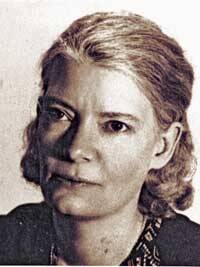It is when the Communists are good that they are most dangerous. And the trouble with many Catholics is that they do not recognize this dangerous goodness but think of Communists as characters from E. Phillip Oppenheim’s international mystery novels.
Not long ago a Catholic novel was published by the MacMillan Company, and it was all about the fiendish Bolsheviks and their international agents and how refugee women of gentle birth were kidnapped and returned to Russia to be mated to nobles, in order that they might propagate a race of supermen....
The story is obnoxiously class-conscious. Nobles are nobles by nature as well as by birth, and the lower classes are noble in that they are the faithful servitors of those above them. If they are interested in those of their own class, and in righting the wrongs done them, then they are beetle-browed Bolsheviks.
And lastly, the story is untrue.
My association with the radical movement began while I was in college and continued for a decade. I worked for the Socialist paper, the Call, for the radical monthly, the Masses, for the anti-conscription League, for the Communist monthly the Liberator, and for the Anti-Imperialist League, and in these various jobs I became acquainted with many people connected with the labor movement, so that I can write from actual knowledge of the goodness of the people with whom I came in contact....
And then there is the case of the boy who lived across the street from me on East Fifteenth Street, between Avenue A and First Avenue, a peaceable Communist youth who was killed a few months ago when a Trotskyite sought to break up a Communist street meeting by hurling bricks from the roof of an adjoining house.
He had for years been the support of his invalid mother, his unemployed father, and his schoolgirl sister....
He was not wild eyed, shaggy haired, revolutionary looking. He was not a hater of the institution of the family. He worked and served his father and mother and sister. He had courtesy and respect for his fellow-man, and at night, after his day’s work, he studied to better his condition. His life was actuated by a love of his fellows, and in his love for his fellow-creatures he forgot his Creator, if indeed he had ever known Him. Together with other boys on this street, he had been brought up without any religious training, and in growing up, he, with high ideals, had espoused the cause of the worker....
He went to meetings, discussed the questions of child labor, workingmen’s rights and unemployment, and donated from his own small earnings towards strike funds to feed the hungry workers, and the mothers and children of other workers like himself.
It is because of the Communist party’s ideals, not because of its essential anti-religious aspect; because of its love of the ordinary man, and not because of its hatred towards God, that so many young people are being attracted towards Communism. And being attracted by what is good in their natures, and fervently embracing it as a cause, they come eventually to accept whole-heartedly all the party teaches.
In the Communist movement in America, the question of religion only comes up when a strike is being carried on in a Southern mill town, for instance where the mountaineers are sincerely believers, or in city factories where the foreign labor is Catholic. In these cases, here are Lenin’s directions in his writings on religion:
A Marxist must place the success of the strike movement above all else, must definitely oppose the division of the workers in this struggle into atheists and Christians, must fight resolutely against such a division.... We must not only admit into the...party all those workers who still retain their faith in God, we must redouble our efforts to recruit them. We are absolutely opposed to the slightest affront to these workers’ religious convictions.... We do not declare, and must not declare in our program that we are atheists.
I do not know whether the boy across the street knew what he was doing—that he was working with the distinct end of tearing down the Church. I do know that the good Irish and German neighbors didn’t know it. They said sadly: “He was a good boy, a fine boy,” and they wept at his passing.
Read the full text of this article here.








